January
- The Dancers of Noyo - Margaret St.Clair. 'How long would men dance beneath the whips of the androids?' Dull 1973 SF novel in which our heroes get captured and escaped with relentless monotony (sometimes between chapters) and a lot of unexplained spooky action at a distance stuff goes on, groovy cover though.
- The City Dwellers - Charles Platt (1970) A collection of linked short stories, snaphots from a loose future history that charts the decline of the human population which clings stubbornly to a decaying city. Reminded me that I haven't read Bradbury's Martian Chronicles for a few years. I like books that are collections of short stories that form a larger narrative. Keith Roberts Pavane is very good example. The City Dwellers is a pale shadow of both those books.
- The Jungle Book - Rudyard Kipling Bedtime reading with the girls.
- Projections 10 - ed. Mike Figgis
- The Food of the Gods - HG Wells. 40 odd years since I read this. I must have been a tenacious reader as a kid or skipped a lot. I don't remember it being anything like a preachy as it is. People sermonise at each other at great length.
- Diary of a Nobody - G & W Grossmith
February
- Gentlemen of the Road - Michael Chabon. Rollicking old-fashioned historical adventure yarn full of hairsbreadth escapes and convenient coincidences which only stopped me dead in its tracks once. The word 'teamster' seemed wildly out of place in the world of the Byzantine Empire.
- The Syndic - C M Kornbluth. A 1953 SF novel set in a future where the Syndicate and the Mob rule. Surprisingly funny.
- The Priests of PSI - Frank Herbert. More proof, if proof be needed, that had he not written Dune, Herbert would be long forgotten by now.
- Solaris - Stanislaw Lem. I have meant to read this for a long long time. The 1972 film version has been a favourite of mine since I first saw it in the mid 70s. After repeated watchings I'm still no clearer what it's all about. Reading the book hasn't really helped me to a deeper understanding of it. The film is much more layered and mysterious, with the book (which in parts I found ponderously dull) acting as a central core from which much more interesting ideas and images have been spun.
- Vortex: New Soviet SF - Ed. C G Bearne. More Soviet era SF. Short stories this time, a couple of them interesting, A couple just dull and a couple of them so hackneyed they wouldn't have been out place in a copy of Tales to Astonish:
- Run to the Stars - Michael Scott Rohan. Modern(ish) but 'good old-fashioned', 'only one man can save the Earth', crash and bash SF. (Except that, in the end, he doesn't manage it and the implication is that he also fails to stop a planet full of aliens getting destroyed too.)
March
- Toyman- E C Tubb. The third (of the 33) adventures of lone rent-a-hero, Earl Dumarest as he wanders the galaxy looking for his lost home planet, Earth. I read several of these as a kid and remember them as not being that interesting. I was right. Page turning pulp from an author credited with writing over 140 novels and 230 short stories and novellas, many of which I must have read but none that I can bring to mind. Curiously, re-reading Toyman 35 or so years after I first read it bought back none of the memories of time or place that re-reading half remembered books often invoke. Utterly forgettable - I probably didn't even notice I was reading it.
- Tales of Wonder - H G Wells. Not quite as wonderful as they probably once were but interesting as precursors of modern SF. One story 'The Star' is an interesting precursor of Wells' own War of the Worlds.
- Mission to the Stars - A E Van Vogt. More weirdness from Van Vogt - though not as weird and badly written as his later stuff. Starts out as a rip roaring full blown space opera (one spaceship has a crew of 30,000!) and ends as a cheesy romance. The odd shape of the book may be due to the fact it is a 'fix-up' of previously published stories.
- Into the Labyrinth - Francoise Mallet-Joris. 'A tender and Brutal Story of Forbidden Love' no less.A French teenager is seduced by her father's mistress and swans around wallowing in self-inflicted teenage misery for 150 pages before deciding to stop.
I adored her for saying that. She was holding in her lap a long sheaf of flowers and she looked, in her yellow blouse, like a dazzling idol a Mexican or Incan godess in a temple lost in the jungle full of precious stones and serpents. And on my shoulder she laid her hand, that brown, hard, lined hand of a haymaker, not at all the hand of a sexual pervert but rather a hand made to lie on the neck of a horse or the hip of a woman, with its fingers a little too flat, a little too supple, evoking the hands of Chinese torturers. The author was only 19. - Veruchia - E C Tubb. More instantly forgettable adventure (5 of 33) with lone rent-a-hero, Earl Dumarest. This time the book contained a fantastic amount of blank paper. Most publishers seem to like to start chapters on the recto (right hand) page so if a chapter ends somewhere on a right hand page it will be immediately followed by a blank verso (left hand) page. Here chapters are headed by a chapter number that takes up a whole page. The numbers aren't very big and are surrounded by a lot of white paper (well yellowish and slightly foxed paper, this book is 40 years old), this is followed by a blank verso page and the text of the next chapter starts about a third the way down the following recto. This book is 191 pages long. By the time you have taken away all the blurbs, printing history, 'other books by this author', title page, and advertising at the back, you are left with 181 pages. 18 pages of that (10%) are totally blank apart from the chapter numbers (that's whole pages, I haven't included all the bits, the blanks thirds at the start of every chapter and the half empty pages at their ends which must add up to another four or five pages in total). No wonder it didn't take long to read.
April
- Of Time and Stars - Arthur C Clarke. More quaint, old-time SF shorts.
- Kaleidoscope Century - John Barnes.
- Raven 2: A Time of Ghosts - Richard Kirk the pen name for Robert Holdstock who was writing with his tongue firmly stuck in his cheek. Well, I hope he was taking the piss; it made me laugh so much.
- Invasion of the Body Snatchers - Jack Finney. A crackingly well paced little chiller which copped out at the end - the films' endings are a vast improvement.
- Sea-horse in the Sky - Edmund Cooper. Read in one sitting, in one eyeball out the other, 'so what' SF.
- The World Grabbers - Paul W Fairman. Mercifully short novel of indeterminate genre in which our hero goes from one pointless circular conversation to another without learning anything about his nemesis or why a mysterious group of mystics won't stop him from taking over the world. Right at the end of the book the mysterious group of mystics do decide to stop him taking over the world for no apparent reason (other than the author had hit his contracted number of words) and the book just stops. Groovy cover though..
- Earth Abides - George R Stewart. Early (1949) post-apocalyptic SF.
- A Rage in Harlem - Chester HimesAnother book bought for 25p just because I liked the cover. What a discovery. It's great. I'm on the lookout for more Himes.
- Duel - Ed. William Patrick, a collection of "Horror stories of the road" that varied from ancient and creaky stories that just didn't bear resurrecting to a couple of interesting, more modern pieces. The best is the title story by Richard Matheson.
- Charisma - Michael Coney. Mid 70s British SF novel which swithers between being a traditional crime novel (who did murder the obnoxious hotel owner businessman Mellors?) and a parallel world love story. The only people who can travel to a parallel world have to be dead in the world they are going to; if the person in the destination world was still alive and the two met they would cancel each other out and vanish. The hero loves a girl who is dead in this world and conversely he is dead in hers. Lots of to-ing and fro-ing between worlds as the hero becomes the main suspect in the murder case (probably because he did it - or rather his doppelgänger from another world did.) Lots of the same characters dying in different ways and it's all getting wonderfully confusing and mind-boggling before it all gets resolved in a cop-out ending that appears from nowhere. (But with a final twistette to sweeten the disappointment.) Christopher Nolan should make a film version.
May
- Wildeblood's Empire - Brian M Stableford. Innocuous mid 70s SF.
- The Anarchistic Colossus - A E van Vogt. Late, and therefore almost incoherent, van Vogt. Van Vogt is one of those rare writers who actually seemed to get worse over the years. SF writer and critic Damon Knight said that
van Vogt "is no giant; he is a pygmy who has learned to operate an overgrown typewriter." Knight described The World of Null-A as "one of the worst allegedly-adult science fiction stories ever published." About van Vogt's writing in general, Knight said: In general van Vogt seems to me to fail consistently as a writer in these elementary ways: 1. His plots do not bear examination. 2. His choice of words and his sentence-structure are fumbling and insensitive. 3. He is unable either to visualize a scene or to make a character seem real.
And though I agree with just about every word of that I find his books compulsive reading. They are so odd I just can't put them down and while his contemporaries from the Golden Age went on to write longer and longer more complex tomes (I'm thinking particularly of Robert Heinlein's later doorstops of novels) van Vogt continued write fairly short books. This one clocks in at 176 pages and I had no idea what was going on for most of them. - The Wages of Fear - Georges Arnaud. Another book picked up because I liked the groovy cover - then remembered the film was pretty terrific.The book is pretty good too. From time to time it looks like it's suffering from translator trouble and it takes a long time to get to the meat of the story but when we get there the almost suicidal attempt to drive two trucks loaded with Nitroglycerine along a rough and unmade South American road is gripping stuff.
- Lieutenant Gullivar Jones: His Vacation (1905) - Edwin Lester Arnold. Limp 'I go to Mars by some magical means (flying carpet!?) and almost have some incredible coincidence-laden adventures, including rescuing and falling in love with a Martian princess, before being mysteriously returned to Earth'. Six years later Edgar Rice Burroughs used almost exactly the same storyline in his A Princess of Mars, Burroughs made his hero more vigorous and proactive, made the coincidences even more outrageous, and cleaned up. Princess of Mars still sells by the shitloads and is getting a film adaptation as we speak, Gullivar Jones is an obscure bit of SF that is almost totally forgotten; though the character Gullivar Jones does geekily turn up from time to time in more modern works. He is the first character to appear (magic carpet and all) in Vol 2 of Alan Moore's League of Extraordinary Gentlemen adventures.
- Simon Rack: Earth Lies Dreaming - Laurence James. The first book by the incredibly prolific Laurence James (he wrote at least 150 books under various pseudonyms). The first of a short lived series, five books were published, featuring an interstellar James Bond type and his pun prone sidekick. All sex and violence. Being published in the seventies the violence is bone-crunching, eyeball-poppingly graphic and, being British, the sex never quite happens on the page. It's total shite.
- The Monitors - Keith Laumer. Funny (in places)1960's SF.
June
- The Undercover Aliens - AE van Vogt aka The House That Stood Still which is my second favourite pointless book title. (The first is The Man With Only One Head). More bewilderingly plotted nonsense from a master of the genre. This time the bewilderingly plotted nonsense concerns a bunch of immortal Aztec cultists and their radioactive marble house and one of their number's overly complex shenanigans to destroy the others and take over the world. When I tell you that the plot involves secret tunnels (as does every other van Vogt book I have read. I suspect he wrote secret passages into his spaceships when he could), immortal Aztecs pretending to be Martians and destroying nuclear bomb factories in hostile countries, secret spaceships that launched from (and returned to - without anyone noticing) downtown office blocks, lifelike masks which could be applied in seconds and make the wearer indistinguishable from whoever they were modelled upon, a three thousand year old mind-reading alien robot, a private investigator, phials of three thousand year old plus transuranic elements 'unknown on Earth', and a hero who manages to fall in love with the daughter of an ancient Roman official in Britain (shipwrecked in California (sic) on her way home to Rome) - and get slugged unconscious several times during the course of the 172 pages, you will have some idea of why, even having just finished the damn thing, I have no idea who did what to whom or why in the end. Imagine Enid Blyton deciding to write an SF novel while on acid. That's the flavour.
- Screen Burn - Charlie Brooker. I laughed. A lot. I have no idea who half the people he was talking about were but his spleen is so well vented I don't think I missed much. Most wannabee celebulites are pretty interchangeable anyway (from what I gather from my brief glances at the covers of Hello!, Chat! Take a Break! and Twat! and the other celeb mags up on display at the checkouts in Morrisons - in true Charlie Brooker style I just made that last one up though, to continue in Brooker mode, it would make make a great magazine - Celebs naked from the waist down. I'd buy it.) More!
- The Status Civilization - Robert Sheckley.
- Dawn of the Dumb - Charlie Brooker. I laughed. A lot. Again.
- The Saint Closes the Case - Leslie Charteris. I've never read a Saint book before which I thought was an oversight. I doubt if I will read another.
July
- Body Politic - Paul Johnston. A serial killer novel set in an ill thought out Orwellian future. Another of those books set in a hypothesised future written by someone who don't like (or understand) SF. The author even disclaims any SFness on his webpage, "the novels are not sci-fi" he says. Which raises the question why bother coming up with a (not very) complex society different from our own in which to set the story? Sorry, kiddo, you do that and you've stuck a bloody big SF label on yourself no matter how hard you deny it's there and, unfortunately for you, it's going to get measured, judged, whatever by the rules of that particular genre. As a crime novel, I've read worse, as an SF novel, it's shit.
- Adam, One Afternoon - Italio Calvino.
- Wetworld - Mark Michalowski. A dire Dr Who novel only because daughter number one had just read it and I wanted to see what she what she was enjoying - she's young.
- I am Legend - Richard Matheson. First time I had ever read it. Another Must read classic of the genre ticked off. Not bad.
- The Underground Man - Ross MacDonald (a Lew Archer Mystery). Dreadfully dull. I will not be going back for more.
- Fear and Loathing in Las Vegas - Hunter S Thompson. Many years since I read this. I had forgotten how funny it was.
- Michael Tolliver Lives - Armistead Maupin. Many years since I read the Tales in the City books (end to end, in one go) and this was a wistfully sad little coda.
- Foundation - Isaac Asimov. Another of those Great Novels of SF which, when you actually look at them objectively don't look that good all these years later. In this one we get to see the fall and rise of Galactic Empires via the medium of people in offices describing the political situation to each other in one to one meetings.
- Bad Science - Ben Goldacre. One of those books which I am going to lend to people and loose.
August
- The Eye in the Pyramid - Robert Shea and Anton Wilson. The first of The Illuminatus! Trilogy. Not as weirdly compelling as when I read it back in the early 80s. But I was stoned half the time back then.
- The Survivalist No. 6: The Savage Horde - Jerry Ahern. Jesus, Mary and all the Saints! This has to be THE single most fuckingly awful book I have ever read. 59 chapters spread over 208 pages (that's 3.5 pages per chapter - though some are actually less than a page long) of porny gun-wanking in which our 'hero', John Thomas Rourke, shoots people. Lots of people. He must kill at least hundred people in this book. He doesn't ask many questions before shooting them either, but it's all right really, this is Post Apoc America and the people he kills with relentless and boring frequency are all 'brigands' or 'wildmen', hairy ill-shaven (and therefore amoral) targets for clean shaven and God fearing him to gun down page after page after page after page.
“He already had the target-a man about six-foot four, unshaven, his black leather jacket mud-stained, a riot shotgun in his hands, the pump tromboning* as the twelve-gauge, roughly .70 caliber muzzle swung on line.”
To break the monotony reading about John Thomas shooting people in the head page after page we are often treated to fetishistic descriptions of guns being reloaded; the hero's weaponry: a pair of chromed Detonics Combat Master .45 pistols in Alessi shoulder holsters, Colt Python and Colt Lawman revolvers, an A.G. Russell Sting 1A knife, and a shoulder sling with a CAR-15 assault rifle; and, occasionally, a parallel story in which John Thomas' wife shoots hairy amoral, would be rapists in the head with either an M-16 assault rifle or .45 automatic - even their 8 year old son gets in the act and shoots the occasional hairy ill-shaven biker in the head - though he has to make do with an antique lever action .30-30 Winchester rifle. There are twenty-nine books in the series. Four books after this one (according to Wikipedia) the united Rourke family get themselves cryonically frozen and wake up 500 years later - by which time the human race will have presumably bred enough targets for them to bother getting up again.*'Tromboning' is, apparently, a genuine shooting term and nothing to do with the male gay sexual act of the same name. - The Disaster Zone - J G Ballard.
- Bonk: the Curious Coupling of Science and Sex - Mary Roach. Mildly entertaining, but sometimes irritatingly smug, book about the science of sex. Very reassuring too, every time I read about another interestingly horrible sexual dysfunction it was like ticking off another 'No' box in some extensive medical check-list in my head. I came out the other end of the book reassured by my (relative) sexual non weirdness, but above all glad I don't spend my days doing any of this research for a living - or even masturbating pigs to orgasm to increase their fertility, as employees on Danish farms are encouraged to do (there is an illustration showing how to do this). Not one to read anywhere near kids who are likely to over your shoulder and ask, "What's that man doing?"
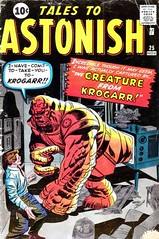
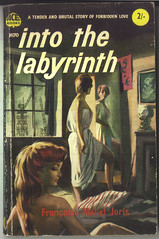
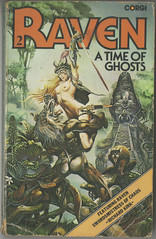
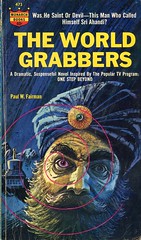
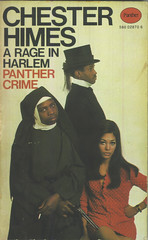
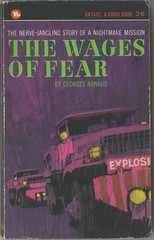


No comments:
Post a Comment